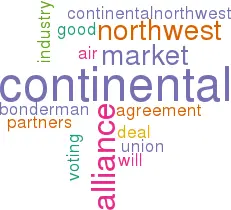CO/NW - trendsetter?
February 1998


The 13–year alliance signed between Continental and Northwest is probably a good move for the two US majors, but it is very unlikely to unleash merger mania.
The catalyst for the Northwest/Continental deal was the desire of Air Partners (AP), the investment group led by David Bonderman, to realise its investment in Continental.
Air Partners purchased shares and warrants in 1993 that gave it 19% of the equity and 36% of the voting rights for $55m (before Continental refunded $11m of AP’s fees). The sale of Air Partners’ interest in 1998 is valued at $511m ($411m in cash plus NWA shares), which represents 14% of the equity and 51% of the voting rights (part of which will be placed in a neutral voting trust).
Bonderman has proved to be an expert in identifying potential in companies within aviation and other sectors that more traditional financiers have laughed at. In 1992/93/94 Continental was posting net losses of $135m, $207m and $132m respectively, was entering Chapter 11, had terrible union relations and a messy brand. In 1997 Continental produced a net profit of $385m, enjoyed good union relations and had a very acceptable international brand. He was also an investor in Ryanair when it had serious problems in the early 1990s and made a similar proportional return when it was successfully floated last year.
The worrying aspect for the industry is that Bonderman is probably as good at identifying the correct time to exit markets as finding the right place to enter them.
The proposed Continental/Northwest alliance is certainly not a merger in the 1980s sense. The driving force is not the usually disappointing search for economies of scale and market share (incidentally in the early 1990s Continental was more than 10% larger in terms of ASMs than it is today). Rather it appears to be designed to exploit difference in regional dominance while maintaining the size of the operating companies at an efficient level.
Reasons for expecting this alliance to uncover those elusive synergies are:
- Continental’s US hubs — Houston, Newark and Cleveland — are located far enough away from Northwest’s — Minneapolis, Detroit and Memphis — to avoid duplicating services.
- Continental is expanding rapidly into Latin America from its Houston base while Northwest has no presence in this market and could presumably feed Continental.
- Northwest is almost like an Asian airline in disguise such is the importance of its Tokyo hub, which is fed from numerous points in the US.Continental’s Pacific strategy mainly involves feeding Continental Micronesia at Guam. In the current market and in anticipation of a more liberal US–Japan ASA, broadening the scope of its transpacific market must surely be beneficial for Northwest.
- Most intriguing of all is the North Atlantic market, as a cooperation agreement with KLM is part of the deal. This could allow the alliance to develop a multi–hub system on both sides of the Atlantic, linking in Alitalia with whom KLM signed an agreement in December 1997. However, this alliance will not achieve its full potential unless Northwest is able to serve Malpensa, preferably under anti–trust immunity for the three carriers, which in turn would require the signing of an open skies agreement between the US and Italy. But Continental currently code–shares with Alitalia on the New York- Milan route and is the favourite to become Alitalia’s US partner, so perhaps Continental and Northwest could come to some arrangement in order to develop a joint transatlantic operation.
In the end though, the success of the alliance will depend on how the management teams under Gordon Bethune and John Dasburg get along.
Some stock–market analysts are inferring a new industry consolidation phase from the Continental/Northwest alliance, with US Airways being put into play. However, there was a particular financial reason for the Continental/Northwest deal, and there does appear to be a genuine complementarity between the operations. If American or United were to buy out US Airways they would mainly be buying increased size, with all its attendant problems, plus union complications and a cost structure unsuited to the next downturn. But then again market psychology rather than cool commercial logic may determine how the US industry evolves.